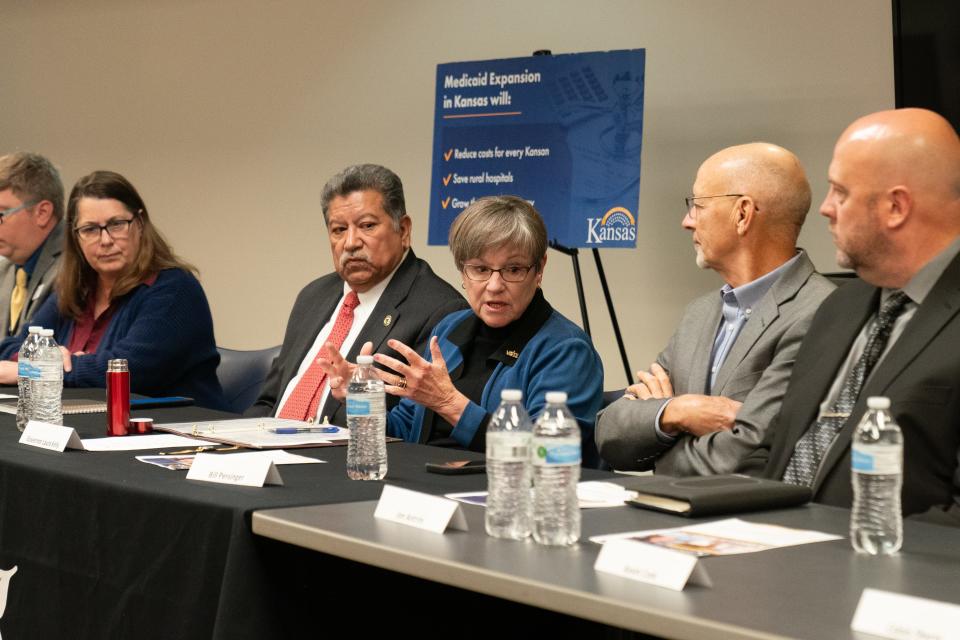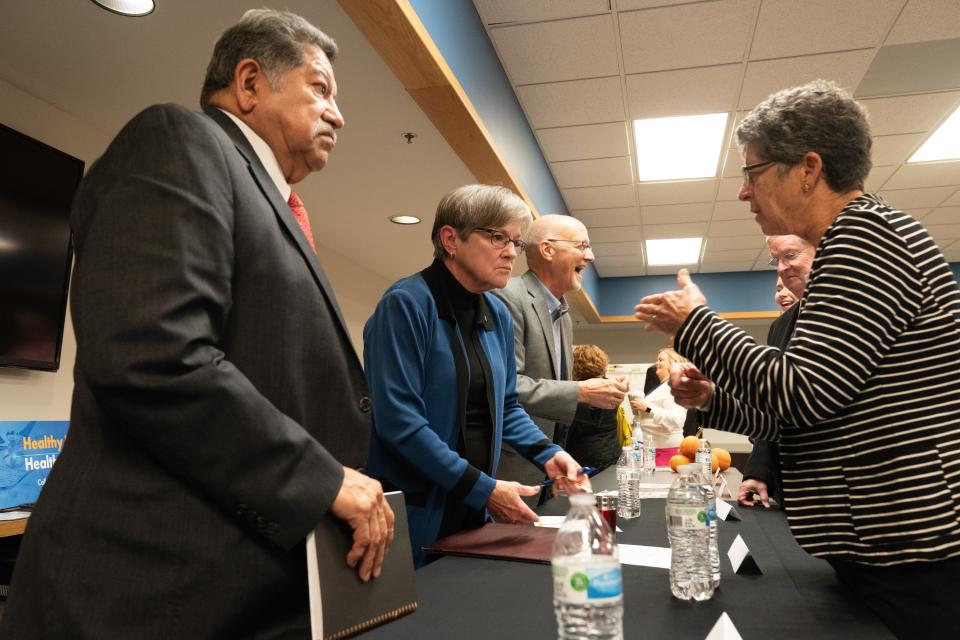Here's how Gov. Laura Kelly says Medicaid expansion would benefit Topeka and mental health
- Oops!Something went wrong.Please try again later.
Gov. Laura Kelly brought her statewide Medicaid expansion campaign to Topeka this week, touting the benefits it could bring to Shawnee County.
"We're doing this tour — the Healthy Workers, Healthy Economy Tour — to really elevate the issue in the minds of Kansans all over the state so that they take what they learned from these events and take them right to their legislators," Kelly said. "It is only the Legislature that can make this happen."
Republican leadership has derided the Democratic governor's campaign as the "Governor's Welfare Express Tour."
Kelly has been unsuccessful in getting Medicaid expanded in her past five years as governor. She has promised to try for the sixth time when legislators return to Topeka in January, and she is urging Kansans to contact their representatives and senators directly.
Kelly administration says Medicaid expansion would benefit Topekans

In a Tuesday roundtable discussion at Valeo Behavioral Health Care in Topeka where she noted the capital city's legacy of the Menninger Clinic, Kelly highlighted benefits of Medicaid expansion to mental health specifically.
A handout at the roundtable estimated that 3,614 uninsured people in Shawnee County would receive health care coverage under Medicaid expansion. It also estimated 1,203 new health care jobs in Shawnee County and $31 million in new annual health care spending in the county if Medicaid were expanded.
Kelly said Medicaid expansion would provide coverage to about 150,000 Kansans, and about 140,000 of those are people who have jobs, but the employer doesn't provide insurance and the employee can't afford to buy it.
"The health of our workforce is dependent upon Medicaid expansion," she said.
Andy Brown, commissioner of behavioral health services at the Kansas Department for Aging and Disability Services, said Medicaid expansion would cover about 25,000 to 30,000 Kansans with behavioral health issues who don't have coverage.
He said expansion would mean more patient visits to community mental health clinics, "and what that really means for local communities is more federal dollars coming in to support the work that we're doing."
Brown said Medicaid expansion has been shown to reduce the number of children entering foster care due to neglect. He said an estimated 300 fewer children would enter foster care each year if Kansas expanded Medicaid.
How Medicaid expansion would help Valeo provide mental health care in Topeka
Bill Persinger, CEO of Valeo Behavioral Health Care, said, "Medicaid expansion would likely infuse another $1.5 million into our $25 million a year budget for doing what we do now."
A Stormont Vail representative at the roundtable said the estimate for the hospital is $40 million to $50 million a year.
Persinger said about 30% of Valeo's 6,500 clients a year are uninsured.
"Many of whom are working, but individuals who live on $800, $900 a month, $1,200, the lucky ones maybe $1,500 a month," he said. "They don't have the dollars to spend on behavioral health care."
Persinger said there are individuals with unfulfilled needs.
"Many of them are working, low-income and have serious mental illnesses, bipolar disease, schizophrenia, many of them have such serious dark depressions that their functions are impaired," he said. "We want to do our part to work with the whole health and social system to get people back up on their feet and get to recovery so they can work, have a home and reunite with families."
That $1.5 million would be reimbursement for current charity care for people who can't afford health insurance.
If Medicaid expansion provided Valeo with that $1.5 million, "We will be able to balance our budget moving forward and continue to say yes to everybody who comes through the door," Persinger said.
How Medicaid expansion could help with homelessness and crime

Topeka Mayor Mike Padilla said that since he became a police officer in 1970, the city has always had agencies trying to provide care to others.
"Here in Topeka, I'm fortunate to work in a community that has a lot of caring people, a lot of agencies, that have stepped forward and have done that over the years," Padilla said. "But their capacity is strained. The need to be able to have some support due to the expansion of Medicaid would be an extremely important part of how we move forward."
The lack of health care and particularly mental health care "drives behaviors or actions that then strain the resources of our community," Padilla said, pointing specifically to crime statistics and housing statistics.
Persinger said expansion would increase Valeo's capacity, strength, presence and outreach, including providing more mobile access care to unsheltered people.
Padilla said homelessness has expanded due to many circumstances, including higher costs of living, but expanding Medicaid would help reduce the stress on the community.
"Right now we're all stretched to the point that we're doing the best we can with what we have," he said. "If we had more opportunities, we could do more, we could reduce the numbers, we could help, I believe, keep people from getting involved into behaviors that eventually follow the mental health issue, like self medication or drug abuse, because that's the last resort for many of those people."
Sherrie Vaughn, executive director of the Kansas branch of the National Alliance on Mental Illness, said many uninsured people who cannot access mental health care turn to self medicating with substance abuse.
For some, that turns into "they're out on the streets, and if they're out on the streets, the next thing we've seen is that they're in county jail," Vaughn said.
Padilla said society would be better off spending money on Medicaid expansion instead of increased incarceration.
Professional medical care can help people become productive, Padilla said, and "restricting that access in any way, shape, or form, without regard to what the ripple effect and unintended consequences are, is short sighted."
"That's what we pay our taxes for," Padilla said. "We pay our taxes for our governments to provide the basic needs to our community. So for me, Medicaid expansion is a no brainer."
Supporters: Expansion would benefit health care workforce
Supporters say Medicaid expansion would help the health care workforce.
"Medicaid expansion really does have a significant impact on our health care workforce, and the shortage that we have around that with behavioral health are significant," Brown said.
He likened Medicaid expansion to one leg on a three-legged stool, along with increasing reimbursement rates and expanding certified community behavioral health clinics.
"It would do wonders for our health care workforce," Kelly said. "Right now, we are an island, a Medicaid island, in the Midwest. Every state around us has expanded Medicaid. We are bleeding our health care workers across the borders because they can get paid more and get reimbursed for their services."
Legislative committee will explore considering Medicaid expansion
The Republican-led Legislature has resisted it, with Senate President Ty Masterson, R-Andover, and House Speaker Dan Hawkins, R-Wichita, opposed.
But a special committee on child care may have provided a tiny glimmer of hope to legislators who support it.
While the committee first voted 6-5 on Wednesday against recommending Medicaid expansion as a short-term solution, it later voted 5-4 to leave in Medicaid expansion as a recommended long-term solution.
Officially, the committee is recommending the exploration of considering Medicaid expansion. The argument from expansion supporters was that providing health insurance for poorly paid child care workers could help the child care workforce, and thus make child care more available to families.
"I think it's time that we not bury our head in the sand about how this impacts the workforce," said Rep. Susan Concannon, R-Beloit. "We're just asking for an opportunity to have the discussion and how the fact they would have some health care benefits would improve the workforce situation."
Jason Alatidd is a statehouse reporter for the Topeka Capital-Journal. He can be reached by email at jalatidd@gannett.com. Follow him on X @Jason_Alatidd.
This article originally appeared on Topeka Capital-Journal: Kansas Gov. Laura Kelly promotes Medicaid expansion in Topeka event

